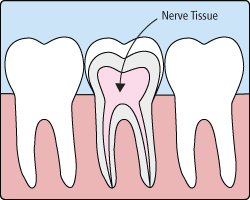Root Canals

Before root canal therapy became a common dental procedure, a tooth with a diseased nerve would almost always need to be extracted. Though root canal therapy has developed a bad reputation, it's often a relatively simple procedure that can preserve your natural tooth and keep you functioning normally long after completion of treatment.
Root canals are necessary when an infection develops inside your tooth. When a tooth is cracked or has a deep cavity, bacteria can enter the pulp. Germs can cause an infection inside the tooth. When left without treatment, pus builds up at the root tip in the jawbone, forming a "pus-pocket" called an abscess. An abscess can cause the pulp tissue to die. When the infected pulp is not removed, pain and swelling can result. Certain byproducts of the infection can injure your jawbones and your overall health. Without treatment, your tooth may have to be removed.
Treatment often involves from one to three visits. During treatment, your DDA dentist or endodontist (a dentist who specializes in root canals) removes the diseased pulp. Removal of diseased pulp and nerve do not affect the long-term health of your tooth; once a tooth has been in the mouth for a time, a functioning nerve is no longer necessary. Once the pulp is removed, the pulp chamber and root canal(s) of the tooth are cleaned and sealed. Often posterior teeth that have endodontic treatment should have a cast crown placed in order to strengthen the remaining structure.
As long as you to continue to care for your teeth and gums with regular brushing, flossing, and exams your restored tooth can last a lifetime.


